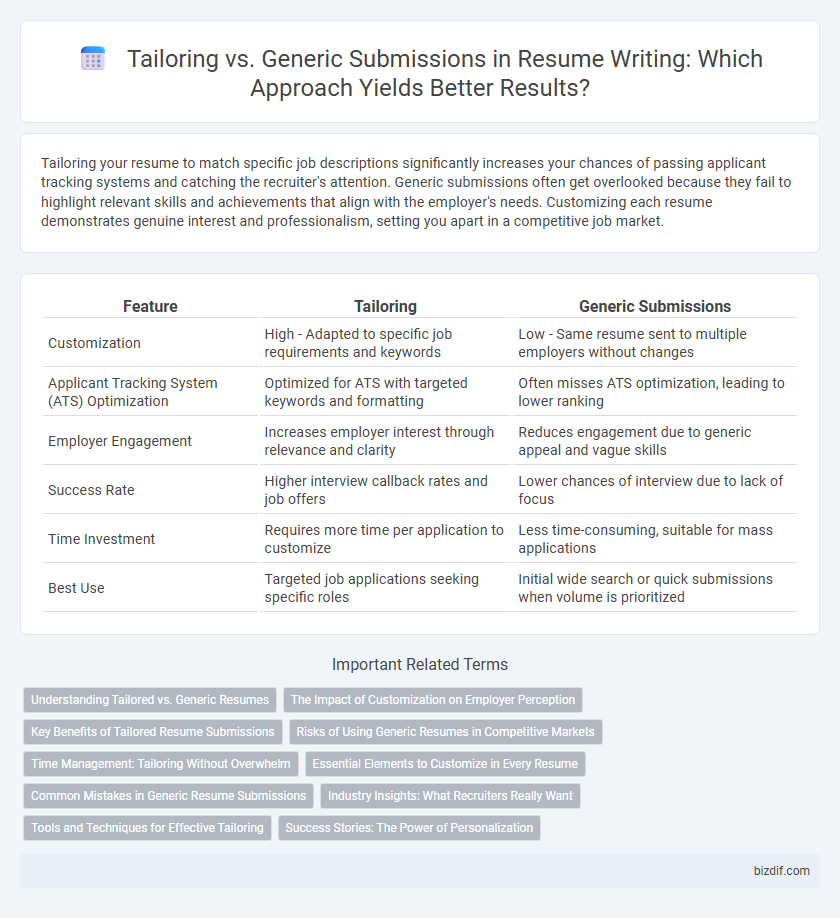Tailoring your resume to match specific job descriptions significantly increases your chances of passing applicant tracking systems and catching the recruiter's attention. Generic submissions often get overlooked because they fail to highlight relevant skills and achievements that align with the employer's needs. Customizing each resume demonstrates genuine interest and professionalism, setting you apart in a competitive job market.
Table of Comparison
| Feature | Tailoring | Generic Submissions |
|---|---|---|
| Customization | High - Adapted to specific job requirements and keywords | Low - Same resume sent to multiple employers without changes |
| Applicant Tracking System (ATS) Optimization | Optimized for ATS with targeted keywords and formatting | Often misses ATS optimization, leading to lower ranking |
| Employer Engagement | Increases employer interest through relevance and clarity | Reduces engagement due to generic appeal and vague skills |
| Success Rate | Higher interview callback rates and job offers | Lower chances of interview due to lack of focus |
| Time Investment | Requires more time per application to customize | Less time-consuming, suitable for mass applications |
| Best Use | Targeted job applications seeking specific roles | Initial wide search or quick submissions when volume is prioritized |
Understanding Tailored vs. Generic Resumes
Tailored resumes target specific job descriptions by highlighting relevant skills, experiences, and keywords that align with the employer's requirements, increasing the chance of passing Applicant Tracking Systems (ATS). Generic resumes provide a broad overview of qualifications but often fail to address the unique demands of each position, reducing effectiveness in competitive job markets. Understanding the distinction between tailored and generic resumes is crucial for job seekers aiming to improve interview rates and secure desired roles.
The Impact of Customization on Employer Perception
Tailoring resumes to specific job descriptions significantly enhances employer perception by showcasing relevant skills and experiences, increasing the likelihood of passing applicant tracking systems (ATS). Generic submissions often appear unfocused, reducing engagement and signaling a lack of genuine interest in the position. Customized resumes demonstrate attention to detail and align candidate qualifications with employer needs, boosting hiring managers' confidence in the applicant's suitability.
Key Benefits of Tailored Resume Submissions
Tailored resume submissions increase the likelihood of passing applicant tracking systems by incorporating job-specific keywords and skills directly from the job description. This approach highlights relevant experience and qualifications, making it easier for hiring managers to see the candidate's fit for the role. Customized resumes demonstrate genuine interest and effort, which can significantly boost interview invitations compared to generic submissions.
Risks of Using Generic Resumes in Competitive Markets
Generic resumes often fail to highlight specific skills and achievements relevant to targeted job roles, reducing the candidate's chances of standing out in competitive markets. Employers and Applicant Tracking Systems (ATS) favor tailored submissions that demonstrate a clear match with job descriptions and company needs. Using generic resumes increases the risk of being overlooked, as these documents typically lack the detailed keywords and customized content required to pass initial screening processes.
Time Management: Tailoring Without Overwhelm
Efficient time management in resume writing balances tailoring each application with avoiding overwhelm by using customizable templates and focused keyword adjustments aligned with specific job descriptions. Prioritizing high-impact roles for full customization while applying a streamlined, keyword-rich version for less critical applications optimizes effort and increases callback potential. Leveraging digital tools for tracking application statuses further refines the process, ensuring strategic use of time without sacrificing resume quality.
Essential Elements to Customize in Every Resume
Tailoring a resume requires customizing essential elements such as the professional summary, skills, and job experience to match the specific job description and industry keywords. Highlighting relevant accomplishments and quantifiable results ensures alignment with the employer's needs, increasing the chances of passing applicant tracking systems (ATS). Generic resumes lack this targeted approach, often resulting in lower visibility and reduced interview opportunities.
Common Mistakes in Generic Resume Submissions
Submitting generic resumes often leads to overlooked job-specific keywords and a failure to highlight relevant skills, causing automated Applicant Tracking Systems (ATS) to reject applications. Common mistakes include using broad, vague descriptions instead of quantifiable achievements and neglecting to align experience with the job description. This approach reduces the chances of passing initial screenings and diminishes the overall impact of the resume.
Industry Insights: What Recruiters Really Want
Recruiters prioritize tailored resumes that directly align with the job description, showcasing relevant skills and experiences instead of generic submissions. Industry insights reveal that specificity in keywords and demonstrated achievements significantly enhance a candidate's chances of passing Applicant Tracking Systems (ATS) and catching recruiter attention. Understanding sector-specific language and emphasizing measurable results reflect a deeper commitment and cultural fit, qualities valued by hiring managers.
Tools and Techniques for Effective Tailoring
Using Applicant Tracking System (ATS) software to parse resumes emphasizes the importance of tailoring documents with specific keywords and phrases from job descriptions. Techniques like keyword mapping, customization of resume sections, and targeted skill highlighting enhance compatibility with ATS algorithms and improve recruiter engagement. Tools such as Jobscan, ResyMatch, and VMock provide analytics for optimizing keyword density and relevance, ensuring tailored submissions outperform generic resumes in automated screening.
Success Stories: The Power of Personalization
Tailoring resumes to specific job descriptions significantly increases interview callbacks by highlighting relevant skills and experiences that align with employer needs. Success stories reveal candidates who customized their resumes saw up to 50% higher response rates compared to generic submissions, demonstrating the power of personalization. Personalized resumes not only capture recruiters' attention but also convey genuine interest and fit, essential factors in today's competitive job market.
Tailoring vs Generic Submissions Infographic

 bizdif.com
bizdif.com